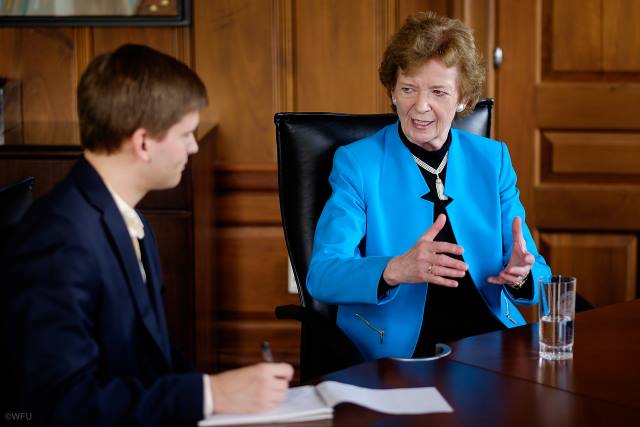Delivering the keynote address at the “Voices of our Time” event at Wake Forest University, US, on 26 March, Mary Robinson addressed the need for a people-centred approach to climate action that links human rights, development and climate change.
The event was part of a symposium on the “Human Face of Environmental Inequality” which took place at Wake Forest University from 26-27 March.
Relating to the symposium, Mary Robinson, President, Mary Robinson Foundation – Climate Justice, highlighted the need to keep a human face to the climate discussions and to apply a climate justice approach:
“Too often we tend to focus on the processes, agreements and international discussions and this allows us to detach ourselves from the human impacts of climate change. Climate justice links human rights and development to achieve a human-centred approach, safeguarding the rights of the most vulnerable and sharing the burdens and benefits of climate change and its resolution equitably and fairly.”
During her speech, Mary Robinson referred to the fact that on February 1, 1960 a little over 30 miles from Wake Forest University, the “lunch counter sit in” by the Greensboro Four marked a significant moment in the fight for racial equality in the United States. She said:
“Fifty-five years later, one of the four young men who staged the sit in, Jibreel Khazan, has said that “climate change is young people’s ‘lunch counter moment’ for the 21st century.” He also says that “it is the biggest threat to justice and opportunity our planet has ever seen”. I too believe that climate change is the biggest threat to humanity of the 21st century.”
Mary Robinson commended the work of a “good friend and ally” Professor John Knox, who is Professor of International Law at Wake Forest University. She welcomed his reappointment and new position as now UN Special Rapporteur on the issue of human rights obligations relating to the enjoyment of a safe, clean, healthy and sustainable environment, and highlighted that he is playing a key role in progressing the issues of human rights and climate change.
Mary Robinson further stated:
“In designing the global response to climate change we have an opportunity to eradicate extreme poverty, ensure access to clean energy for all and achieve equitable access to sustainable development. (…) To deliver this action on the scale and in the timeframe required to avoid dangerous climate change, the global community must act in solidarity and invest in the transition to zero carbon and zero poverty in all countries.”
In order to address these challenges and opportunities the world is presented with in 2015 and beyond, Mary Robinson called on the audience to be thought leaders on climate justice and recognize the importance of the year 2015 to take urgent action on climate change:
“We have a great opportunity this year. We need to ensure that we use this opportunity and make a difference to ensure that our voices are heard and we all become the voices of our time.”
Related Links
Mary Robinson’s Keynote Address at “Voices of Our Time”, Wake Forest Univeristy
MRFCJ Position Paper: Human Rights and Climate Justice
Zero Carbon, Zero Poverty – The Climate Justice Way
Wake Forest Symposium on “The Human Face of Envrionmental Inequality”
Human Rights Matter for Climate Action
UN Independent Experts: Open Letter on Human Rights and Climate Change


